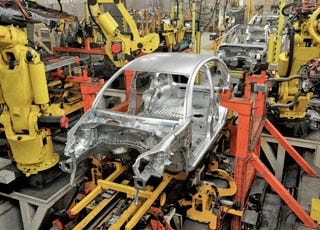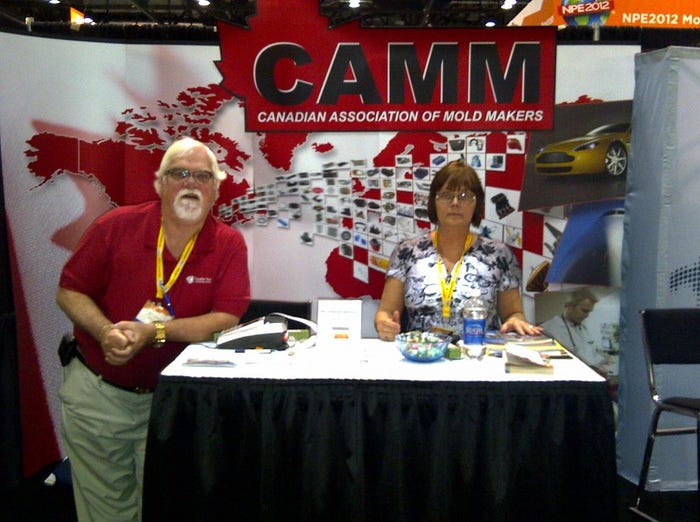Canadian plastics sector optimistic at home, opportunistic abroad through new FTAs
Montréal, Quebec - David Palmer, chairman of the Canadian Association of Moldmakers (CAMM) told PlasticsToday that Canadian tool shops are busy with activity.
November 28, 2012
Montréal, Quebec - David Palmer, chairman of the Canadian Association of Moldmakers (CAMM) told PlasticsToday that Canadian tool shops are busy with activity.
"We've seen a resurgence; we've seen a recovery of the automotive sector," Palmer said at Expoplast (November 14-15; Palais des congrès de Montréal; organized by PlasticsToday parent, UBM Canon). "At the same time, we're also looking at other opportunities in this global market."
The Canadian $26.2 billion plastics industry features more than 3198 companies and employees, according to Canadian Plastics Industry Association. This multi-faceted sector encompasses plastic products manufacturing, machinery, molds and resins.
The industry is concentrated in Ontario, Quebec, British Columbia and Alberta. In fact, Ontario is the third largest plastics-producing region in North America.
There are three major sub-sectors of the Canuck's plastics industry: packaging, building materials, and transportation/automotive. Arguably, automotive is the main driver of the Canadian plastics sector as the country is considered one of the world's largest exporters of automotive goods.
Automotive driving toward improvement
After the automotive industry came to a screeching halt during the economic meltdown of 2008, government funds, including $3.3 billion from the Canadian government, helped keep General Motors and Chrysler's engines running.
 While there's no doubt that the auto industry faced troubling times, Palmer said 2011 year was a good year for the country's moldmakers, especially those that worked with the recovering automakers.
While there's no doubt that the auto industry faced troubling times, Palmer said 2011 year was a good year for the country's moldmakers, especially those that worked with the recovering automakers.
This year, automakers in Canada had their best October to date, with industry sales up nearly 7%, according to DesRosiers Automotive Consultants. The consulting firm said the industry is on track to have a record year.
"You can definitely say it looks like work is coming back here," Palmer said.
At Expoplast, injection molding and automation supplier Engel showcased its victory spex injection molding machine. Using a tie bar-less technology, the company touts the machine's space and investment savings. The machine features the Engel ecodrive, which can reportedly result in energy savings of 70% over a standard hydraulic machine.
Steve Elliott, general manager of Engel Canada, said the machine had received some interest from potential customers at the show. While in the past, Quebec producers weren't as concerned about saving energy, that thought process is starting to change as customers are looking to reduce costs anywhere they can, he said.
Generally speaking, Elliott said the company has experienced growth in the Canadian market in the past year.
"The Canadian market is highly focused on automotive and there's been a lot of success in Quebec and growth in the past year," he said. "The general economy is good. We expect 2013 to be as consistent. We don't anticipate major growth or a major drop."
Moldmakers exploring the global market
Plastics industry exports totaled $13.8 billion in 2010, according to Statistics Canada.
While Canada continues to have a healthy trade surplus in plastic products with the U.S. ($1.1 billion in 2010), this has been offset in recent years by increasing imports from Pacific Rim countries such as China, Japan and Indonesia, CPIA stated.
Palmer said CAMM is always looking into ways to expand its trade and market presence. While he believes they have successfully opened up markets globally through membership fundraising and government assistance, they still want to make their profile bigger. The association has traveled to Brazil, Argentina, Germany and the U.S. to attend trade shows where they can display the sector's capabilities and explore opportunities.
successfully opened up markets globally through membership fundraising and government assistance, they still want to make their profile bigger. The association has traveled to Brazil, Argentina, Germany and the U.S. to attend trade shows where they can display the sector's capabilities and explore opportunities.
"We're looking closely at Brazil, Argentina, and Mexico, which have all evolved with a huge amount of growth," he said. "We look at how we can get better trade agreements and how to get a bigger voice."
Christian Paradis, Minister of Industry and Minister of State (Agriculture), opened the Expoplast 2012 tradeshow where he addressed members of the advanced manufacturing and plastics industries.
"With the world economic outlook still uncertain, we are working to strengthen Canada's position as a trading nation," he said. "We have also created a sound economic framework such as paying down the debt, lowering taxes, reducing red tape and promoting increased Canadian exports to global markets."
He discussed how the government is eliminating tariffs on machinery and equipment, making Canada the first tariff-free zone in the G20.
When they're done, this will mean savings of almost $400 million a year for Canadian businesses, Paradis said.
In addition, since 2007, the country's Global Commerce Strategy has led to new free trade agreements with nine countries, as well as deeper trade ties with priority markets like Brazil, China, India, Japan and the European Union, he said.
"Of course, a key part of supporting manufacturers is ensuring that you have global markets for the goods you produce," Paradis said. "That's why we've undertaken the most ambitious trade expansion plan in Canadian history."
This includes a comprehensive next-generation trade agreement with the European Union. A trade agreement with the European Union is expected to bring a 20% boost in bilateral trade and a $12-billion annual increase to Canada's economy, he said.
Next generation recruitment
As baby boomers reach retirement age, every manufacturing sector realizes it's crucial to recruit the younger generation to the field. Palmer said in 2013, CAMM will have a specialized focus on recruitment.
"We must get the younger generation thinking about moldmaking," he said. "We need to go to the high school level and college to get kids involved. But we need the big players in the industry to work with us and universities to see how we can rejuvenate the workforce."
He said CAMM works closely with St. Clair College and the secondary school boards to ensure that youth sees potential in the industry as a stable career choice.
Paradis said that since manufacturing is now a more high-tech industry, they need to have people with the skills and the know-how to be able to succeed.
He said the government has increased support for skills development, including a hiring credit for small businesses, an additional $5 million over six years to strengthen foreign credential assessment and a boost in apprenticeship funding for tradespeople.
"So, a number of initiatives on a number of fronts - taxes, technology, trade and talent - all are key for manufacturing," Paradis told the audience. "But we know more can be done. At the end of the day, the future of manufacturing in Canada does not lie in Ottawa or in Québec City or in Halifax or in some government program. It lies with you."
About the Author(s)
You May Also Like


